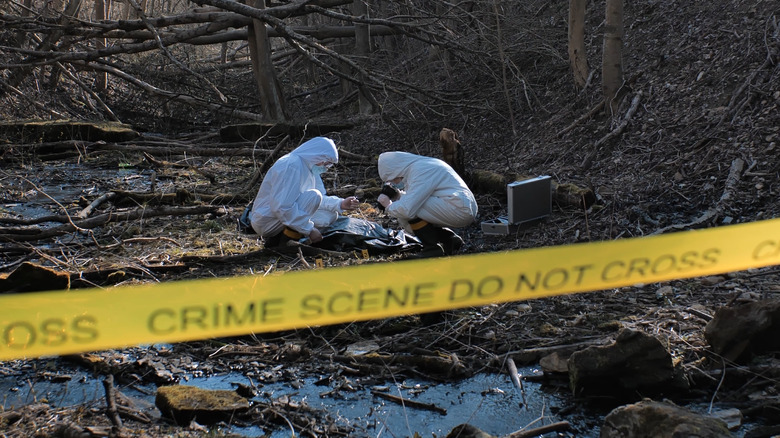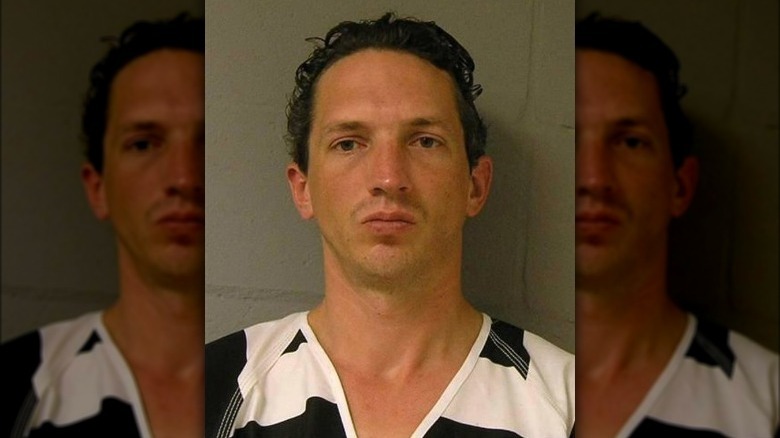True Crime Expert Weighs In On Bed-Wetting & Childhood Trauma In Serial Killers - Exclusive
From Jack the Ripper to Jeffrey Dahmer (and a whole lot of disturbing criminals in between), serial killing — defined by Britannica as two or more murders committed by the same person in separate incidents — is always a source of horror and fascination. According to World Atlas, there could be as many as 50 serial killers on the loose in the U.S. today. What intrigues most audiences about serial killers is how the murderer in question could be capable of such a violent and inhumane act; or instead, if there could be one particular indicator that might help identify — and potentially stop — a serial murderer before they take their first human life.
Based on recent estimates, millions of true crime books are sold each year, and many are published on the topic of serial murder. As well as print, an increasing number of podcasts, TV series, and other types of media now also cover the topic (via TIME). For these reasons alone, the general public's interest in serial murder seems unlikely to waiver. Mike Oh is the creator of the true crime YouTube channel "That Chapter," and he's researched hundreds of serial killer cases for his work. According to Oh, psychological profilers and law enforcement professionals now have some answers as to how serial killers get started, and one shared trait among them is bed-wetting.
The MacDonald triad
According to Healthline, one key indicator for future violent behavior is known as the MacDonald triad, and Mike Oh from YouTube's "That Chapter," speaking exclusively to Dvmmoms, says there's some truth to the theory. "The Macdonald triad essentially says that obsession with fire, bed-wetting, and cruelty to animals as a youth are factors which tend to be linked to murderous behavior later in life," he explained. The presence of any or all of those factors doesn't necessarily prove someone will one day become a serial murderer, but they are likely more prone to future violent behavior, he adds.
"I've covered hundreds of cases and dozens of serial killers, and when researching, those three factors appear again and again. It's not always the three together, but at least one will appear in a killer's background," so much so, it's more surprising when you don't see any of them in a serial murderer's profile, Oh continues. Referring to notorious serial killer Israel Keyes (pictured), Oh points to arson early on in Keyes' life. As a teen, Keyes also skinned live deer, Oh says (via Biography). The MacDonald triad is far from a catchall, Oh cautions: Not every child who lives with these experiences grows up to be a cold-blooded killer, he says, "... but cold-blooded killers will nearly always have had at least two of those factors in their childhood."
Are serial killers born or made?
Given that the MacDonald triad can be found in the background of most violent criminals, including serial murderers, Oh tends to believe that for this reason, serial killers are more often made rather than simply born with the propensity to commit their horrific crimes. That question remains unanswered in the opinion of some experts, though, such as Psychology Today, as they report evidence of a specific genetic predisposition that may indicate that someone will one day end up a murderer or, at the very least, commit a violent crime.
Although Oh grants that genetics likely play a part, as well as potential head injuries that can sometimes impact feelings of empathy and self-control, he goes on to explain, "It's rare to see a serial killer who had a happy childhood." Serial killers almost always come from abusive households, either emotionally, sexually, and/or physically, and these childhood influences impact greatly how they kill and how their victims are selected, he continues. "Having said that, some persons may be predisposed to psychopathy from a genetic standpoint. However if these people grow up in normal, healthy households it would be unlikely they would go on to commit murder," Oh says.
If you or someone you know may be the victim of child abuse, please contact the Childhelp National Child Abuse Hotline at 1-800-4-A-Child (1-800-422-4453) or contact their live chat services.


